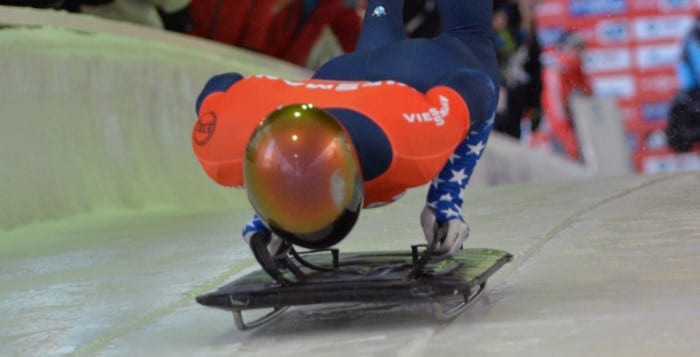Smithtown’s Daly prepares for second Olympics
28-year-old skeleton racer will go to Sochi, Russia
By Daniel Dunaief
Four years ago, he was just happy to be there. Weeks before the world turned its attention to Vancouver for the 2010 Winter Olympics, Smithtown’s John Daly had no idea whether he’d be watching the games from home or representing the country in the high-speed sport of skeleton racing.
Now, Daly, 28, is preparing for his second winter games in Sochi, Russia. He finished 17th in Vancouver and is approaching the competition, which is scheduled for Feb. 14 and 15, with a different attitude.
“I’m confident, I think I could do really well,” Daly said via Skype while in St. Moritz, Switzerland for one of the pre-Olympic qualifying races. “In the last game, I was a long shot. In this one, I’m truly prepared. If ever there was a race to win, it’s this one coming up.”
Daly competes in skeleton racing, where he digs his spiked shoes into an ice track, extends his arm and dives headfirst onto the sled. He races at speeds of more than 80 miles per hour, his chin inches above the frozen track. He steers by shifting his weight slightly, as spectators hear something akin to a freight train seconds before he becomes a bullet blazing down the bluff.
Daly said the four years of training and living have helped him maintain his focus in a race where the difference between a medal and fourth place is measured in hundredths of a second.
Thoughts about the action, the crowd and “how crazy would it be if I medal” may have hurt him in Vancouver.
“That’s when you start to put yourself days and hours ahead. I’m staying in the moment. I will take it one day at a time, one curve at a time.”
Tuffy Latour, the coach of the men’s and women’s skeleton team for the United States, suggested that the focus shouldn’t be on winning medals. Instead, his team needs to have “good starts and good drives” while “believing in themselves.”
As the number of days dwindle until he takes those last deep breaths before diving down the mountain, Daly and his family are preparing for a trip that’s more than 5,200 miles from their home.
His mother, Bennarda, a nurse at St. Catherine of Siena Medical Center in Smithtown, is thinking about “all the silly little things,” including making sure her husband, James, son, James, daughter, Kristen and sister, Sabina Rezza of Kew Gardens, make their flights.
The designers of the Sochi track originally wanted to make the course among the fastest in the world. A fatal accident in Vancouver, however, caused them to redesign their course, which now includes uphill sections that cut down on a slider’s speed.
“They wanted [the racers] to go to 100 miles per hour,” Daly said. “But they slowed it down to 83 miles per hour.” It makes the track especially unforgiving of any mistakes.
“With those uphill sections, you can’t mess up, or it’ll mess up the race,” Daly said. ‘You don’t want to teach perfection, but you need to be pretty close.”
Still, Daly has a short, but encouraging, history with this track. He placed fourth last February in a test run, a mere seven hundredths of a second behind third place. He also finished ahead of Latvian Tomass Dukurs, one of the two brothers who have been the dominant force in skeleton racing.
This year, Daly said, everyone on Team USA, including his friends Matt Antoine and Kyle Tress, has beaten at least one of the powerful tandem.
“It shows they are human,” Daly said. “It’s anyone’s game.”
Latour is encouraged by the way his competitors have performed.
“The Dukurs are beatable,” he said through an emailed statement. “Our team has had some fantastic races despite some small mistakes. If we’re going to beat those guys, we have to be at our best. I think we can get there.”
Daly said the only one of his entourage who might want a medal more than he does is his father James, a retired EMS worker for the FDNY.
The elder Daly said he’s so eager to see his son succeed because “when his dreams come true, so do mine.”
In addition to safety, Bennarda Daly has another goal for her son.
“If he knows he did his best, that’s all that matters,” she said.
James Daly said the agony of standing near the track, watching his son prepare for a race, is almost unbearable.
“You almost don’t know how to act,” he said. “There’s so much I want to do. Clapping my hands is all I can do.”
Daly’s mom plans to bring a cowbell to the other side of the world. Lining the track like pieces of metal drawn to a magnet, spectators shout encouragement and clang their cowbells, amplifying their sound and warming up their arms on mountains where icy winds seem intent on defeating wool sweaters, socks and hats.
Daly’s family and friends have been instrumental in getting him to Sochi, he said. When he needed money or he had to change a plane ticket, no matter what the hour, his father would get it done. Daly said he hopes he’s as helpful to his children some day.
James Daly said he learned how to support his family from his father, the late Joe Daly, a police officer in New York City.
As for what Daly will do after the Olympics, he’s considering a career in advertising.
“That’ll be my first actual job,” he said.
The trail from frozen tracks all over the world to the white-hot lights of the Winter Olympics has included its share of financial, physical and emotional sacrifices. He said he still has unaffordable college loans from Plattsburgh State University, where he was an All-American in the decathlon in 2007.
He has also bumped into walls during competitions and finished the races with bruises or blood dripping down his ankle.
Each year, he missed important personal events, including his mother’s birthday early in January, Thanksgiving and weddings. He couldn’t attend seven weddings in recent years.
Still, the opportunity to race down a mountain and represent the country is worth the trade-off.
“I get to be a kid and ride a sleigh,” he said. “How many other 28-year-olds can say that?”







